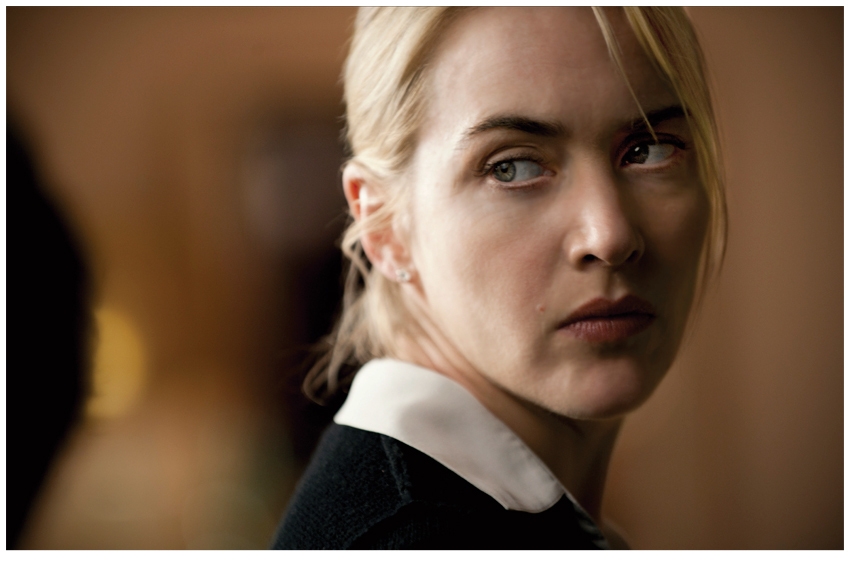Carnage is Roman Polanski’s adaptation of Yasmina Reza’s hit stage play The God of Carnage, in which two sets of parents get together to discuss an altercation between their 11-year-old sons in the hope that they can figure it out sensibly, and all hell breaks loose.
I have my reservations. I’m not convinced the play was exactly begging to be filmed, particularly as Polanski doesn’t open it up and keeps it, more or less, to one suffocating room and hallway, and I’m not convinced it’s particularly deep or insightful, but there is some enjoyment to be had from watching four actors at the top of their game get to where they do get to, even though it’s not much of any place. Plus, most deliciously, it comes in at a marvellously brisk 76 minutes; so if you have nothing better to do, as I haven’t, you won’t be kept from not doing it for terribly long. You’ll be back home frittering time away on the internet or picking fluff from your keyboard with a pin in no time. (My ball of fluff is the size of a ping-pong ball now.)
The film opens with a brief, dialogue-free prologue where, in the distance, we see two young boys in a park shoving and pushing until one hits the other in the face with a stick. (One of these boys, I note later when the credits roll, is played by ‘Elvis Polanski’, which is going to be something to live up to.) The film then switches to a Brooklyn apartment where the parents of the injured party, Penelope and Michael Longstreet (Jodie Foster and John C. Reilly), have invited over the parents of the perpetrator, Nancy and Alan Cowan (Kate Winslet and Christoph Waltz), to talk about the situation.
Penelope is earnest, ostensibly liberal and community-minded, and is writing a book about Dafur. Michael, who on the surface is the most congenial, sells homewares. Nancy is an uptight, expensively dressed investment banker with hair just so. Alan is a brash, scumbag lawyer who is managing some kind of PR crisis for a pharmaceutical company and is rarely off his BlackBerry. All these characters are rather cartoonish — particularly Alan, I think — but as Scooby Doo once said, ‘Nothing wrong with cartoonish. It certainly never did me any harm.’
Anyway, here they all are, transposed from Paris, where the play was originally set, and it’s not comfortable for any of them but they are civilised, fair-minded people, aren’t they? They can sort this out politely and quickly with the minimum of fuss or blame? Not bloody likely! Not a cat in hell’s chance!
Yet although you know all social veneer and fakery will be stripped away — that the claws will come out to protect not just their sons, but also their own self-images — I found I was quite curious as to where the fissures would first occur, and how they would develop. Between the marriages, or within them? Or both? I don’t wish to give too much away but will say that, as momentary allegiances are formed and recriminations fly, various flashpoints include a liberated hamster, a murdered BlackBerry, much drunken truth-telling and — Major Spoiler Alert! Major Spoiler Alert! — the best projectile vomit since The Exorcist.
The posters are selling this as ‘a comedy of manners’, even though there are few actual laughs, and I couldn’t tell you whose manners these are. At no point do any of the characters behave as anyone might behave in real life, or talk as anyone might in real life. Would people who have children at the same school really start by calling each other by their formal married names until one says, ‘Call me Penny’? And, although packaged cleverly, and well directed — Polanski’s camera is always swivelling round the room, making us the spectators — none of it adds up to anything. Our assumptions are not challenged. The characters do not go on any kind of journey. Guilt and responsibility are not explored. If it’s saying that beneath civilised behaviour lies barbarism, I’m thinking it’s not exactly Lord of the Flies.
The joy lies almost entirely in the skilful performances, as the actors hit their marks in a way the script never does, and spit venom at each other with impressive vigour. And lastly? If you stay for the final credits, you will see a little coda which suggests everyone might have been better off if only they’d left the kids to it. Or, as I always said to my own son, ‘Fight your own fights. I’ve got keyboards to clean.’






Comments